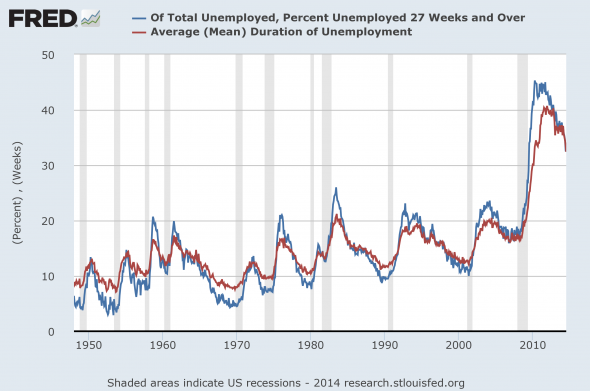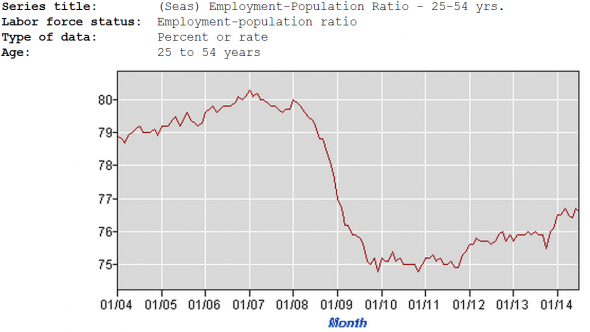Is there something seriously wrong with the economy?
It’s a scary prospect, and a concern that’s gotten louder and louder over the past year. In economic circles, it goes by the alliterative name of “secular stagnation.” And it’s a phrase that Fed watchers are likely to hear more and more in the months ahead.
Recent comments by the vice chairman of the Federal Reserve, Stanley Fischer, indicate questions within the central bank about whether the slow growth that has followed the recent recession could reflect, or at least could potentially morph into, longer-term issues within the economy. And while Fischer avoided the phrase “secular stagnation” in his Monday speech, Minneapolis Fed President Narayana Kocherlakota is planning to host a November symposium that directly addresses the issue of secular stagnation by name, CNBC has learned.
“I think there’s a lot of concern about how long this will last, and I think that’s certainly high on the agenda right now. At least people are entertaining that possibility now that it could drag on for longer,” said Brown University associate professor of economics Gauti Eggertsson, who authored (along with fellow Brown economist Neil Mehrotra) the landmark paper “A Model of Secular Stagnation,” which provides an in-depth explanation of how a long period of low growth could come about.
The theory of secular stagnation was first developed by Alvin Hansen, who wondered in the midst of the Great Depression whether diminishing investment opportunities in a maturing economy would stunt economic growth and permanently prevent full employment—at least in the absence of robust government intervention, which soon came in the form of the second world war.
These theories have found a new life in the aftermath of the so-called Great Recession, as the U.S. is experiencing (albeit to a much less dramatic degree) slow growth over a relatively long time period.
In November 2013, noted economist Larry Summers (who was considered, alongside current Chair Janet Yellen, a leading candidate to head the Fed) began to invoke the same phrase in arguing that the interest rate that the economy requires has fallen below zero.
The problem is that it is very difficult for nominal interest rates to fall below zero due to a constraint known as the zero lower bound. The upshot? Even with the Fed keeping short-term rates just above zero, market interest rates cannot possibly create adequate demand for loans, and thus the economy stagnates.
Without embracing the secular stagnation thesis, in Sweden on Monday, second highest-ranking Fed official Fischer gestured toward those concerns.
Noting slow growth in “labor supply, capital investment and productivity,” Fischer warned that “This may well reflect factors related to or predating the recession that are also holding down growth” and noted: “How much of this weakness on the supply side will turn out to be structural—perhaps contributing to a secular slowdown—and how much is temporary but longer than usual lasting remains a crucial and open question.”
“There was a level of concern on that point that I don’t think we generally hear,” said Nicholas Colas, chief market strategist at ConvergEx, referring to Fischer’s speech.
The stagnation debate will also be addressed by a new eBook entitled “Secular Decline,” which is due to be published on Aug. 18, and hosts contributions from Paul Krugman and Nomura’s Richard Koo, in addition to Summers, Eggertsson and Mehotra, and others.
http://www.cnbc.com/id/101914044
Related Posts
80
Dr Faber is predicting a 1987-type stock market crash this year only it will be worse. The US technology-heavy Nasdaq plummeted by 3.1 per cent on Thursday night (US time), its biggest one-day drop since November 2011. Dr Faber, the editor of the Gloom, Boom & Doom Report, has already…
Tags: will, market, it's, that's, fed, november, growth, trading, economy
73
"The Great Recession--Moving Ahead," a Conference Sponsored by the Swedish Ministry of Finance, Stockholm, Sweden The Great Recession: Moving Ahead The recession that began in the United States in December 2007 ended in June 2009. But the Great Recession is a near-worldwide phenomenon, with the consequences of which many…
Tags: great, recession, will, market, economy, economic, longer, growth, trading, fed
70
Here they are: the most important charts in the world. A lot has changed since the last time we published this collection back in July. The economic situation in Europe has deteriorated, the unemployment rate in the US has fallen below 6%, and the Fed looks poised to conclude its…
Tags: economic, market, will, fed, monday, economy, trading
65
On Tuesday, Federal Reserve Chair Janet Yellen promised the House Financial Services Committee "a great deal of continuity" in monetary policy as she fills the shoes of Ben Bernanke. However, Yellen is not Bernanke. And depending on her read on the economy, she will use her powers to influence…
Tags: economy, will, market, great, fed
62
At Morningstar, AQR Capital’s leader presents Fama and Shiller’s arguments and says he’s ‘learned to live with my schizophrenia’ “I’m not a super-hardcore efficient marketer,” says Cliff Asness of AQR Capital. Cliff Asness created a “watershed moment in the hedge fund industry” when he brought his sophisticated hedge fund strategies…
Tags: market, trading, economy

